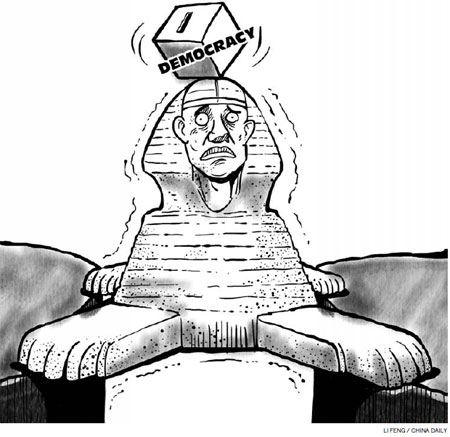Challenges for Egypt after the election
Updated: 2012-06-26 08:04
By Niu Song (China Daily)
|
||||||||

The Muslim Brotherhood's Mohammed Morsi was announced as the winner of the Egyptian election on Sunday night. However, the election proved that it is easier for different opposition groups to join forces to overthrow a government than it is for them to reach a consensus after doing so.
No doubt Egypt is on the road to democracy, but the road is uncertain and there is little hope that the election result will produce an end to 16 months of political turmoil. Unfortunately tensions are high and the possibility of chaos can't be ruled out.
Having won the election, the new administration faces an old test: establishing relations with the military. Ever since Gamal Abdel Nasser took power through a military coup in 1952, the army has played a decisive role in Egyptian politics; observers even say military officers without uniforms actually govern Egypt. Former president Hosni Mubarak's fall was to a large extent caused by the military ceasing to support him.
The Supreme Council of the Armed Forces, which ruled the Arab nation after Mubarak stood down, curbed the powers of the presidency earlier this month, but it has realized that military rule would be unpopular in a nation hungry for democracy. It prefers to influence politics in an indirect way. In the future it will try to be the arbitrator among the different political forces, rather than a direct participant, although it will firmly defend its interests.
However, there are likely to be great changes in Egypt; first of all, the long suppressed Islamic forces can finally take a moderate approach to politics. The Muslim Brotherhood offered much assistance to Nasser in overthrowing the ruling monarchy in 1952, but it was later suppressed by Nasser who held secularist and Arab nationalist beliefs. At the peak of decades of antagonism, extremists from the Muslim Brotherhood even assassinated the then pro-Israel president Mohamed Anwar el-Sadat in 1981. It actually became less extreme because of Mubarak's "trick or treat" policies.
But the rise of the Brotherhood has alarmed the Coptic Christians, who resist the Islamic forces in the country for both religious and nationalist reasons and whose interests were ensured under the old regime. And for many freed democrats who oppose both the Islamic forces and the old regime, the former prime minister Ahmed Shafiq was the preferred option. So a priority for the new government will be to coordinate among the different Islamic forces, Christians, democrats and ordinary people.
Diplomacy will also be directly affected by the change in leadership. The new government will have to build a national image of freedom and democracy and mild Islam; maintain good relations with big powers including China and Russia; and seek the friendship of other Arabic countries and Western countries, as well as Israel.
However, the pressure of Islamic forces might make maintaining relations with Israel difficult.
Egypt has long been a leader in Arab issues, but after the 2011 changes the Gulf Cooperation Council is competing for leadership by casting more influence on Arab states.
But the new regime might establish a new model for a mild Islamic state, whose influence might not be so immediate, but which will surely be longer lasting.
The author is a researcher from Middle East Studies Institute, Shanghai International Studies University.

 Relief reaches isolated village
Relief reaches isolated village
 Rainfall poses new threats to quake-hit region
Rainfall poses new threats to quake-hit region
 Funerals begin for Boston bombing victims
Funerals begin for Boston bombing victims
 Quake takeaway from China's Air Force
Quake takeaway from China's Air Force
 Obama celebrates young inventors at science fair
Obama celebrates young inventors at science fair
 Earth Day marked around the world
Earth Day marked around the world
 Volunteer team helping students find sense of normalcy
Volunteer team helping students find sense of normalcy
 Ethnic groups quick to join rescue efforts
Ethnic groups quick to join rescue efforts
Most Viewed
Editor's Picks

|

|

|

|

|

|
Today's Top News
Health new priority for quake zone
Xi meets US top military officer
Japan's boats driven out of Diaoyu
China mulls online shopping legislation
Bird flu death toll rises to 22
Putin appoints new ambassador to China
Japanese ships blocked from Diaoyu Islands
Inspired by Guan, more Chinese pick up golf
US Weekly

|

|







